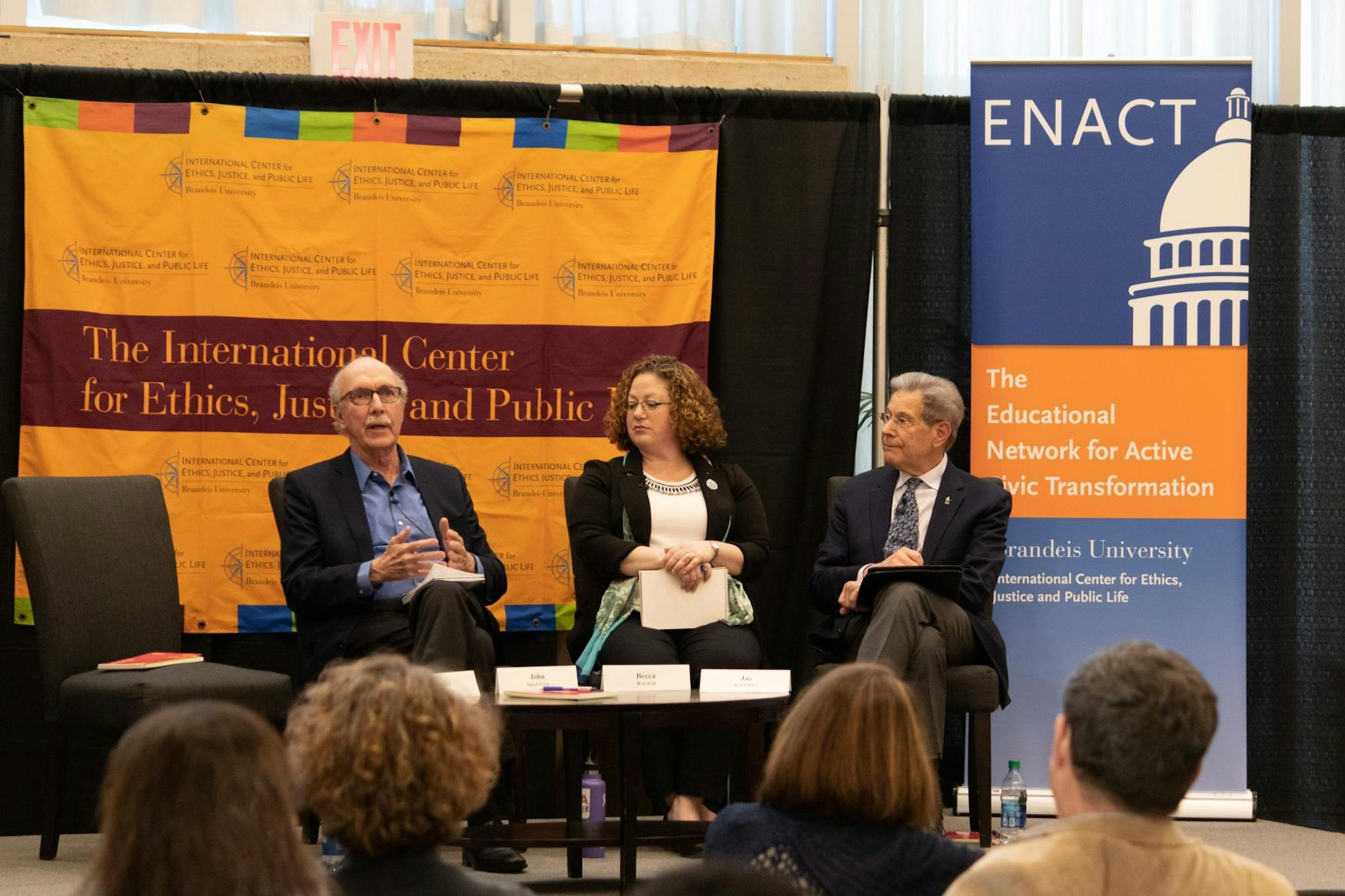Expert panel discusses voting in America
The International Center of Ethics, Justice and Public Life hosted a panel, “Voting and Democracy in 2020 and Beyond,” on Monday, March 9 in Rapaporte Treasure Hall. The panelists were Boston city councilor Lydia Edwards, Massachusetts State Sen. Becca Rausch ’01 and Ethics Center Board chair John Shattuck. Scheduled panelist and mayor of Framingham Yvonne Spicer was unable to attend due to complications relating to COVID-19. Former Rep. Jay Kaufman ’68, MA ’73 (D-MA) moderated the event.
Shattuck began by arguing that while voting is the cornerstone of democracy, the U.S. must “think twice when we claim the first years of our democracy [were] the most democratic,” since the only voters were white male property owners. In addition, growing diversity and an expanding voter base coincided with attempts at voter suppression, Shattuck said. Gerrymandering –– outlining districts to disproportionately benefit one party or the other –– has increased over the 21st century. In 2013, the Supreme Court’s Shelby County v. Holder decision made section five of the 1965 Voting Rights Act unconstitutional. Section five required states with a history of racial discrimination to seek permission from the federal government before changing their voting laws. Shattuck noted that there has recently been a concerted pushback against voting suppression: The 2018 elections had the highest voter turnout in 40 years.
Rausch highlighted key points of voting rights infringement. Unfortunately, one prevalent method of voter suppression is clerical error, she said. If the registration information of a voter is inputted incorrectly, that voter is not allowed to vote because there is no capability to register or reregister a voter on the day of the given election. Rausch noted that there is active legislation in Massachusetts to allow same-day voter registration.
Another voting rights issue is the debate over how to implement automatic voter registration, Rausch said. She noted that in Massachusetts, people are registered to vote when they get their driver's license. However, that style of voting registration, known as front end registration, gives people the choice to opt out of voter registration when registering for their license. Other concerns Rausch highlighted were the implications of COVID-19 public health crisis on voting, particularly for caucuses, and the problem of when elections are held. She ended by saying, “We have much work to do. … We are certainly not as bad off as certain states and certainly not as well off as we could and should be.”
Lydia Edwards highlighted the importance of local politics. She explained that there is very low turnout in her district — which includes East Boston, Charlestown and the North End — because many people have little interest in local elections. Meanwhile, Edwards explained that she and other politicians on her level “control most aspects of [citizen] life,… how [you] interface every single day, … [whereas higher-level politicians] don’t come that far down in terms of your everyday lives,” so she found it “interesting to see such low voter turnout.” Edwards argued that culture and tradition play an important role in voter turnout, saying that Boston used to be run by large families committed to voting, giving them important power in determining the fate of a candidate.
Edwards said that she was not expected to win because certain areas of her constituency were heavily gentrified, expecting a certain mold of politician that she did not fit. Nevertheless, she was able to win by “meeting people where they are,” knocking on thousands of doors and listening to people’s concerns. She realized that in East Boston, the population is around 60% Latino but many did not vote because voting materials were not reaching them. She argued that the focus of politicians should not be on defeating Trump, but instead on speaking to “the issues in everyday life.” According to Edwards, some members of her constituency voted for her even after they voted for Trump in 2016. She remarked that it was encouraging that people are working so hard to suppress the vote, because it shows that Democrats are voting in large numbers and that the Republican Party feels are threatened.
The panelists were asked about their opinion on ranked choice voting, and all panelists said they are supportive of this system. With ranked choice voting, if a candidate wins 50% of the vote, they would be declared winner of the race. If not, the people who voted for the lowest ranked candidate would be transferred to their second choice. Rausch mentioned that ranked choice voting for statewide and federal elections in Massachusetts will likely be on the ballot later in the year. Edwards added that she is also pushing participatory budgeting, allowing people to vote on where to put their money.
Shattuck said ranked choice voting can have a role in reducing polarization by compelling candidates to appeal to a broader audience in hopes of being a second and third choice. He argued that this would reduce the election of extremist politicians, who might be first for a particular group but last for everyone else. Kaufman added that conversely, voters can choose a niche candidate that most appeals to their views, yet they can also have a centrist vote as their second choice.
In response to a question regarding student voting, Edwards turned the question to the students in the audience. One student pointed out that politicians often try to appeal to the youth through stereotypically youth based issues such as legalizing weed and student loan debt, but that students “are people too.[Students] care about more diverse issues.”
Kaufman ended the discussion by saying, “If we raised any questions in your minds and hearts, we did a good job.”




Please note All comments are eligible for publication in The Justice.